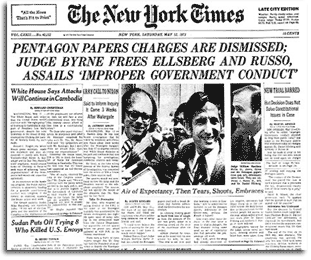dm968315@ohio.edu
It isn't always necessarily simple to decide what is ethically correct and what isn't when working with others. Relationships with coworkers, as well as being comfortable with them, can be crucial factors for one when deciding if something in particular is morally ethical or not. In addition, pressure from higher-ranked coworkers can also add some difficulty to one's thinking when confronted about an ethical issue.
Problems Organizations Face
As mentioned, organizations are subject to ethical dilemmas every day. Because news outlets constantly cover "news" throughout the world, sometimes certain topics are more difficult to report on than others. A particular instance could arise in which something is definitely deemed "newsworthy"; the problem, however, is the publicity and attention that will be brought upon whoever the instance pertains to. For example, in 1971 when initial pieces of the Pentagon Papers were released by Daniel Ellsberg, there was certainly public controversy surrounding the entire situation. Articles were published in both the Washington Post and New York Times that the United States were expanding the territory of which they were attacking during the Vietnam War, along with other government secrets. This indicated President Lyndon B. Johnson's administration had been lying to both Congress and the public. Although the information was somewhat alarming, both publications felt it very necessary to publish in order for the general public to see it, and ultimately became a very important historic moment for both the public relations and journalism industries.
 |
| Headline of the New York Times announcing the charges against the Pentagon Papers are dismissed, and that a judge rules in favor of Daniel Ellsberg and Anthony Russo; photo by https://www.u-s-history.com/pages/h1871.html
Remaining Ethical
Of course, it isn't easy to constantly remain ethical. Organizations tend to encounter problems relating to their own employees, which can sometimes be extremely detrimental. This has been the case recently, with major members of prominent companies being fired or asked to resign for something they did that was simply unethical. Consider the case of former NBC Today co-host Matt Lauer, who went on-air for the last time in 2017. On November 29, 2017, NBC promptly announced the termination of Lauer's contract following a female employee's confession of being sexually assaulted by the co-host during the 2014 Winter Olympics in Sochi, Russia. The victim also included that the harassment continued after they returned to New York.
This is a critical problem facing companies today. Although an employee can be prestigious and have a very successful career, like Lauer, an instance such as this is clearly damaging to a company if they choose to ignore it. In addition, the company may face legal issues, such as a lawsuit, if an employee has a legitimate complaint or problem regarding fellow employees or other members within the organization.
Solutions
There are many ways to avoid ethical dilemmas within the work place. Many organizations establish an ethics code by which employees, no matter what position, must follow in order to ensure a safe and positive environment at work. Another implementation organizations use today is making sure that all employees are comfortable and happy with their working conditions; for instance, companies have recently held meetings with employees in-light of the #MeToo movement (which sexual assault victims have used) in hopes that everything is working properly around the office and, if a problem does exist, that steps can be immediately taken to end the particular dilemma.
|
No comments:
Post a Comment